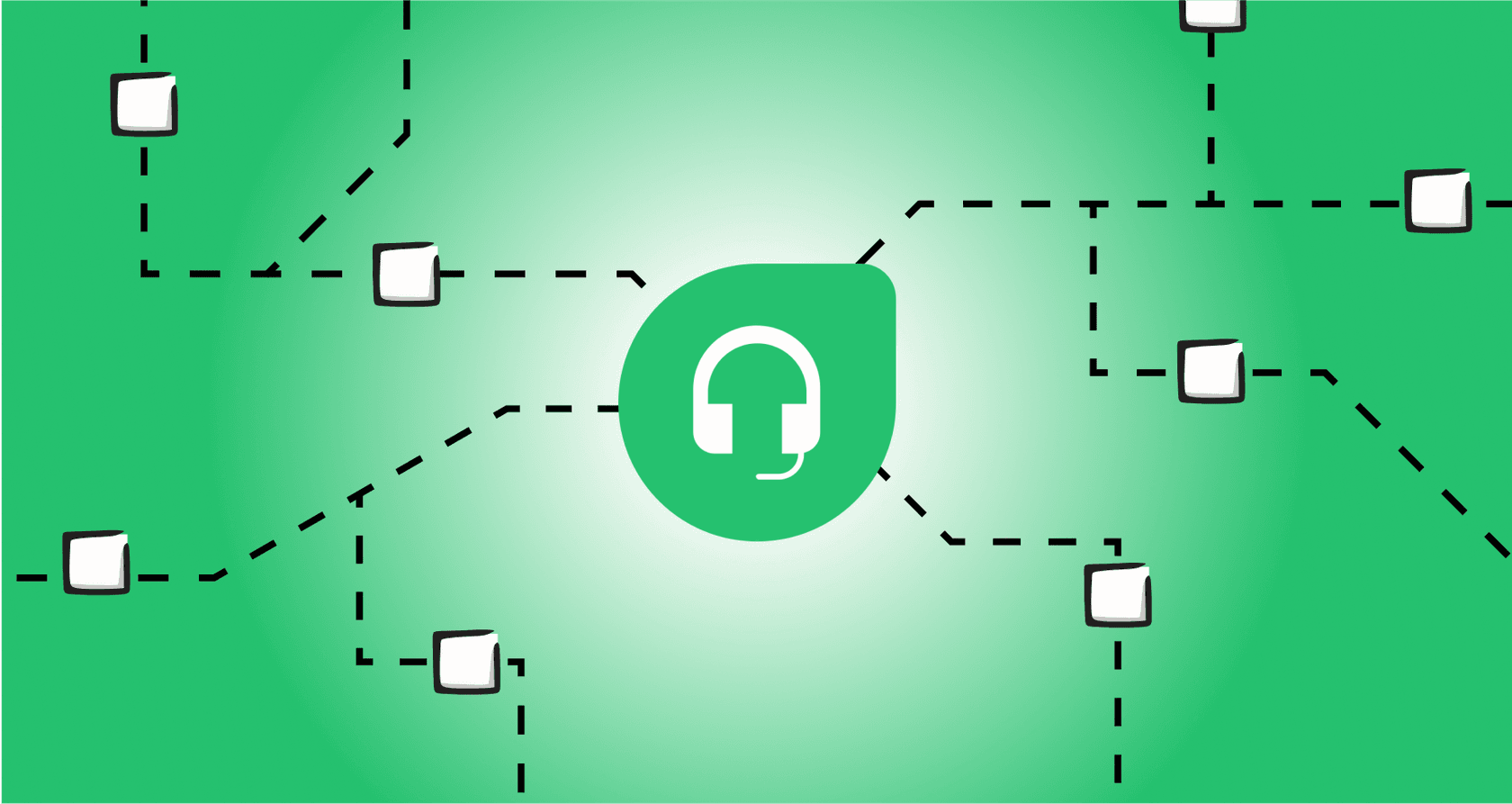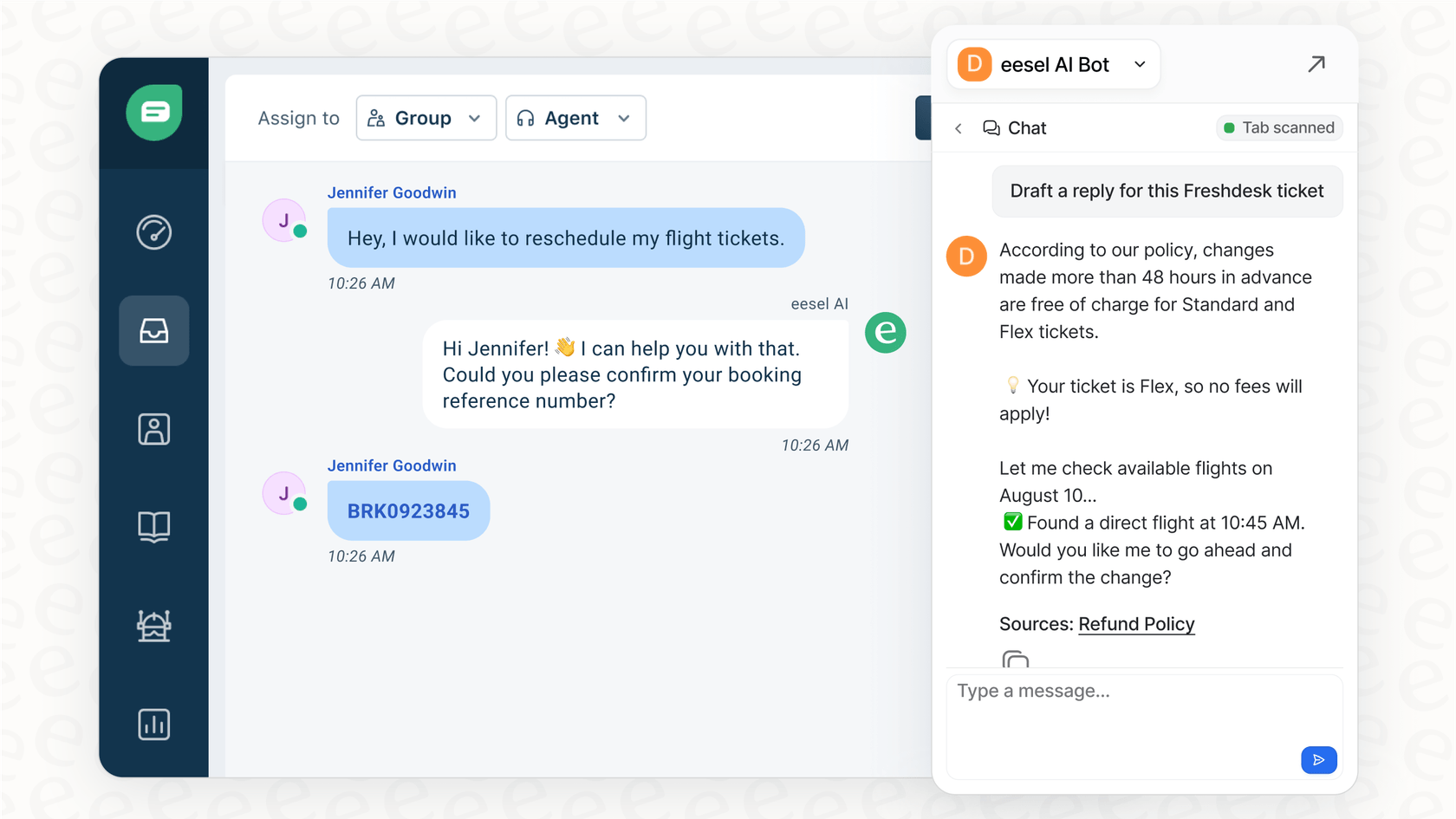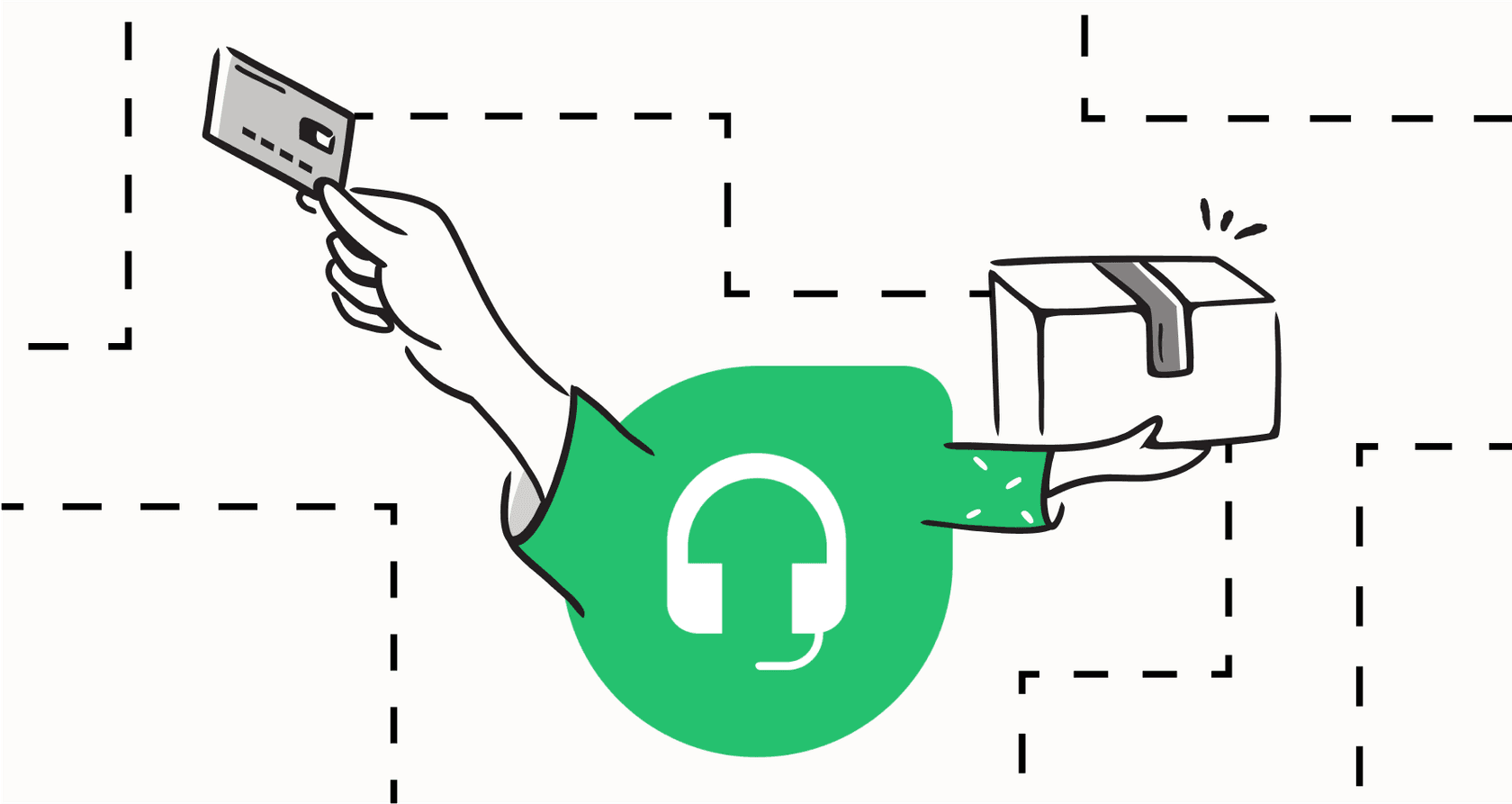A practical guide to Freshdesk SLA policies: What you need to know

Kenneth Pangan

Stanley Nicholas
Last edited January 16, 2026
Expert Verified

In customer support, your word is your bond. A Service Level Agreement (SLA) is exactly that: a promise you make to your customers about how quickly you’ll respond and fix their issues. It sets clear expectations for them and gives your team a clear target to hit.
Meeting your SLAs isn't just about ticking a box on a report; it's fundamental to keeping customers happy and loyal. When you consistently deliver on your promises, you build trust. But the real goal is to use the robust data from these systems to improve service. While platforms like Freshdesk provide the tools to track your SLAs, the key to truly great service is shifting from a reactive approach to a proactive one.
What are Freshdesk SLA policies?
Freshdesk SLA policies are a built-in feature that lets you define and enforce those customer promises right inside your help desk. Think of them as a set of rules that automatically starts a timer on every new ticket. These rules figure out how much time your agents have to respond and resolve an issue based on things like the ticket's priority, where it came from (email, social media), or even the customer's subscription plan.

The goals are straightforward:
-
Make sure every customer gets a reply in a reasonable amount of time.
-
Help your team focus on the most urgent tickets first.
-
Keep your service quality consistent and reliable.
At their heart, these policies are built around a few main settings you can tweak, like response time targets, resolution deadlines, and whether the clock should run 24/7 or only during business hours.
Key components of Freshdesk SLA policies
To set up SLAs that actually work for your team (and your customers), you first need to get familiar with the building blocks Freshdesk gives you. Let's break down the most important pieces you'll be working with.
SLA metrics you can track with Freshdesk SLA policies
Freshdesk lets you measure performance against a few key timers:
-
First response time: This measures how long it takes an agent to send that first reply after a customer submits a ticket. This is a big deal because it's your first chance to say, "We see you, we've got this." A quick first response can build a lot of goodwill.
-
Resolution time: This is the main event. It tracks the entire journey of a ticket, from the moment it's created until it's officially marked "Resolved." It’s a key measure of your team's efficiency and has a positive effect on customer satisfaction.
-
Next response time: For those issues that need a bit of back-and-forth, this metric tracks the time between each reply. It makes sure that once a conversation starts, the customer receives consistent updates.
Operational hours in Freshdesk SLA policies: business vs. calendar
You also have to decide when your SLA clock is actually running.
-
Calendar hours: This is the 24/7 option. The clock runs day and night, including weekends and holidays.
-
Business hours: This option only counts the time during your company's official working hours. If a ticket lands in your queue on a Friday night and you have a 24-hour SLA, the timer won’t start ticking until Monday morning.
There's a trade-off here. Using business hours can help your team manage workloads effectively, while calendar hours provide a direct reflection of the customer's wait time. Both options are valuable depending on your service model.
| Metric | What it measures | Why it matters | Best for |
|---|---|---|---|
| First response time | Speed of the first acknowledgment | Sets customer expectations and shows you're paying attention. | High-priority tickets, social media messages. |
| Resolution time | Total time to solve the customer's problem | Influences customer happiness and team efficiency. | Measuring overall team performance. |
| Next response time | Time between ongoing replies | Keeps customers in the loop and feeling cared for. | Complex problems that require multiple interactions. |
How to manage multiple Freshdesk SLA policies
Once you've got a basic, default SLA policy in place, you can start creating more specific setups for different situations. After all, Freshdesk is flexible enough to handle different resolution targets for a major system outage and a simple question about billing.
Freshdesk lets you create multiple policies that kick in based on a ticket's details. For instance, you could set up specific SLAs for:
-
VIP customers: Give your most valuable clients a premium experience with faster response and resolution times.
-
Urgent issues: Automatically apply a 30-minute response time for tickets marked as "Urgent" or that contain keywords like "down" or "outage."
-
Different channels: Set shorter deadlines for fast-paced channels like Twitter compared to standard email.
To keep your team on track, Freshdesk has built-in reminders and escalations. The system can ping an agent when a ticket is getting close to its SLA deadline. If the time runs out, it can automatically escalate the ticket to a team lead or manager. This is a helpful safety net to ensure no ticket is left behind. The order of your policies is easy to manage - Freshdesk uses the first rule in the list that matches a ticket's properties, so you have full control over how policies are applied.
Maximizing efficiency with Freshdesk SLA policies
The tools inside Freshdesk are a solid foundation for keeping your team accountable. As you grow, you might find ways to complement these tools to move from monitoring to proactive success.
1. Shifting from monitoring to proactive resolution
An SLA timer in Freshdesk is a powerful way to measure performance. To help agents meet these targets consistently, many teams look for ways to simplify the information-gathering process. This reduces the pressure on agents to hunt down answers, allowing them to focus on providing high-quality replies quickly.
2. Centralizing knowledge for faster responses
One way to speed up ticket resolution is to streamline the search for answers. While the native Freshdesk knowledge base is a strong foundation, your team's knowledge may also live in other documents and tools.
- How AI helps: This is where complementary tools like eesel AI add value. It connects directly to your existing tools and pulls your knowledge together from places like past Freshdesk tickets, Confluence pages, and Google Docs. It gives agents instant answers right where they work, helping them meet SLA targets with ease.

3. Enhancing triage and escalation workflows
Freshdesk's escalation features are great for flagging tickets that need attention. To be even more proactive, you can add automation to handle issues before they reach a deadline.
- How AI helps: The eesel AI Agent works alongside Freshdesk to manage frontline support. It can answer common questions and tag tickets correctly, so your human team can focus on the tricky issues that genuinely need their expertise. This helps maintain a healthy queue and prevents SLA breaches.
4. Scaling your SLA policies effectively
Freshdesk offers extensive flexibility for creating detailed policies. As you scale, you can manage these configurations efficiently by using advanced automation. Instead of relying only on manual rules, modern tools help you understand the context of every ticket.
- How AI helps: eesel AI offers a flexible setup that integrates with your workflow in minutes. It uses AI to understand what a ticket is about and applies the right knowledge automatically. You can even simulate how it performs on past tickets to see how it can improve your automation rate.

Freshdesk pricing for support, AI features, and Freshdesk SLA policies
Freshdesk offers tiered plans to match different team sizes, ensuring you have the features you need as you scale. Their native AI features, Freddy AI, are available as add-ons to provide additional capabilities for your agents and automated sessions.
| Plan | Price (per agent/mo, billed annually) | Key features for SLAs and AI |
|---|---|---|
| Free | $0 (up to 10 agents) | Basic ticketing, knowledge base |
| Growth | $15 | SLA management, business hours |
| Pro | $49 | Multiple SLAs, custom reports |
| Enterprise | $79 | Skill-based routing, audit log |
| Freddy AI Copilot add-on | +$29 (on Pro/Enterprise) | AI help for your agents |
| Freddy AI Agent add-on | $100 per 1,000 sessions | AI automation (chatbots/email bots) |
| (Pricing sourced from Freshdesk's official page and may be subject to change.) |
Move from just tracking Freshdesk SLA policies to actually exceeding them
Freshdesk SLA policies are a must-have for any professional support team. They help you set standards, manage customer expectations, and keep your team on the same page. These measurement tools provide the framework for consistent service.
The future of great customer service is about combining these robust tracking features with smart tools that help you solve issues with speed and accuracy. By using the comprehensive ecosystem Freshdesk has built, teams can create a more efficient and supportive environment for their agents.
Power up your Freshdesk SLA policies with AI-powered resolution
To help your team resolve tickets even faster, consider how AI can complement your existing Freshdesk setup.
eesel AI plugs directly into Freshdesk in just a few minutes. It unifies your knowledge and powers an AI Agent that handles frontline support, an AI Copilot that assists your human team, and AI Triage that keeps your queue organized.
Enhance your support workflow and start automating resolutions today. Try eesel AI for free.
Frequently asked questions
Freshdesk SLA policies are built-in rules that define how quickly your team should respond to and resolve customer issues. They are crucial for setting clear customer expectations, prioritizing urgent tickets, and maintaining consistent service quality.
When configuring Freshdesk SLA policies, you can choose to track time using either calendar hours (24/7, including weekends and holidays) or business hours (only during your company's official working times). This choice impacts how the SLA clock runs and when deadlines are met.
Freshdesk SLA policies enable tracking of First Response Time (initial acknowledgment), Resolution Time (total time to solve the issue), and Next Response Time (time between subsequent replies). These metrics help gauge your team's efficiency and responsiveness.
Yes, Freshdesk allows you to create multiple Freshdesk SLA policies that apply based on ticket details like priority, customer segment (e.g., VIPs), or source channel. This ensures that different service levels are automatically applied where needed.
When managing Freshdesk SLA policies manually, teams often focus on monitoring timers to maintain service levels. To improve efficiency, many teams look for ways to streamline the manual triage process and simplify complex rule-based setups for more proactive resolution.
AI tools can help you consistently meet Freshdesk SLA policies by automatically resolving tickets, unifying scattered knowledge for instant agent answers, and intelligently triaging issues. This helps support agents focus on complex tasks and improves overall resolution speed.
Share this post

Article by
Kenneth Pangan
Writer and marketer for over ten years, Kenneth Pangan splits his time between history, politics, and art with plenty of interruptions from his dogs demanding attention.




